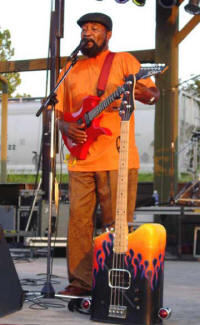University
Communications
Office
Arkansas State University
Jonesboro,
Arkansas
Staff
Markham Howe
Sara McNeil
(870) 972-3056
fax (870) 972-3069
More information:
NewsPage
Links to News Releases
& Announcements
Campus Calendar
Public activities at ASU
Campus News
Faculty and Staff
achievements
About
ASU
Overview, history
and more |
Delta Blues Symposium XIV presents
bluesman James "Super Chikan" Johnson
March 14, 2008 --The
Department of English and Philosophy at Arkansas State University
presents Mississippi bluesman James “Super Chikan” Johnson and his band at Delta Blues Symposium XIV: Sense of Place. Johnson will perform
Thursday, March 27, at 8 p.m. in the Fine Arts Recital Hall, Fine Arts
Center, 114 S. Caraway Road, Jonesboro. This event is also sponsored by
the College of Humanities and Social Sciences. All symposium events,
which continue until Saturday, March 29, on the ASU-Jonesboro campus,
are free and open to the public. For additional information on this and
other symposium events, visit
www.clt.astate.edu/blues or call (870) 972-3043.
band at Delta Blues Symposium XIV: Sense of Place. Johnson will perform
Thursday, March 27, at 8 p.m. in the Fine Arts Recital Hall, Fine Arts
Center, 114 S. Caraway Road, Jonesboro. This event is also sponsored by
the College of Humanities and Social Sciences. All symposium events,
which continue until Saturday, March 29, on the ASU-Jonesboro campus,
are free and open to the public. For additional information on this and
other symposium events, visit
www.clt.astate.edu/blues or call (870) 972-3043.
James “Super Chikan” Johnson, born in 1951, earned his name from his
fascination with his family’s chickens and his attempts to communicate
with them while growing up in the farming community of Darling, Miss.
His uncle, legendary bluesman Big Jack Johnson, influenced Johnson’s own
brand of music. Johnson’s first instrument was a “diddly-bo,” a homemade
instrument made of a length of wood with a strand of wire stretched end
to end. He eventually built a four-string diddly-bo to accommodate
additional sounds he was hearing. Using a Prince Albert tobacco can and
Popsicle sticks, he slid the sticks under each string on top of the can,
providing different pitches. But the demanding work on the farm required
that he also picked cotton, which he began doing at the age of eight.
Johnson bought his first acoustic guitar in Clarksdale,
Miss., when he was thirteen, but since that guitar had only two strings,
so he made it cackle like the chickens. From listening to Jimmy Reed,
Elmore James, Lightnin’ Hopkins, and Slim Harpo, Johnson adapted Reed’s
style to his two-string guitar.
Recognizing him
as a hard worker and eager learner, a land leveller offered him work out
of the cotton fields, and eventually Johnson drove a truck. Johnson
would write down lyrics that would come to him while driving down Delta
roads day after day, and friends encouraged him to record himself
playing and singing. He played with Frank Frost, Sam Carr, Wesley
Jefferson, and Jackie Brenston, and subsequently gained much experience
that would shape his own music. But despite the experience he gained
during those years, he was driven to “crow” on his own and developed his
own distinct style. While drawing some influence from such artists as
Muddy Waters, John Lee Hooker, and Chuck Berry, Johnson performs with an
incomparable individual style. Moreover, he developed his talent for
painting, and the guitars themselves became his canvases. Using
five-gallon military gas cans, he created what he calls his
Chik-can-tars.
In 1997, Johnson produced “Blues Come Home to Roost,” followed by two
more albums, “What You See,” and “Shoot That Thang.” He won the Best
Blues Album and Best Debut Album from the 1998 Living Blues Magazine
Awards and was nominated for a 1998 W.C. Handy Award for “Best New Blues
Artist.” In 2004, Johnson won the Mississippi Governor’s Award for
Excellence in the Arts.
###
|
